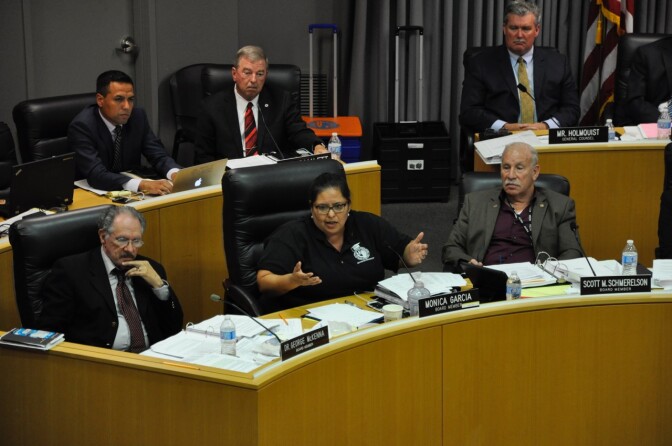This story is free to read because readers choose to support LAist. If you find value in independent local reporting, make a donation to power our newsroom today.
This archival content was originally written for and published on KPCC.org. Keep in mind that links and images may no longer work — and references may be outdated.
LAUSD's 'pro-charter' school board isn't ticking off charter wish list items just yet

When the new Los Angeles Unified School Board was seated for the first time this summer, charter school groups were elated.
The elections of Kelly Gonez and Nick Melvoin clinched a four-member “pro-charter majority” on the board, raising hopes among supporters of charter schools — publicly-funded schools run by outside organizations instead of the district itself — that they might be able to make headway on several priorities.
Among them: winning more flexibility from L.A. Unified rules and regulations for charter schools.
But on Tuesday, a test case for those hopes didn’t go the way those charter school supporters may have wanted.
At the recommendation of L.A. Unified Charter Schools Division staff, the board unanimously decided not to renew Van Nuys-based Lashon Academy, a charter that had fought with the district for more permissive operating terms.
Charter schools must formally ask for permission to remain open every few years from their “authorizers,” the entity that gives charter schools permission to receive public funding. In Lashon’s case, that's L.A. Unified. After the district’s rejection, Lashon can now appeal to a county or state board. If that appeal fails, the school could close.
Overall, L.A. Unified board members still grant far more requests from charter schools than they reject. Even before this spring’s elections, they rarely turned down petitions to open new charter schools; on Tuesday, they still authorized three other charters’ renewal requests.
But the vote on Lashon Academy’s renewal is significant in the charter community because the freedoms they sought are also on the wish lists of charter school leaders across L.A.
For instance, Lashon Academy’s leaders hoped to negotiate language in the school’s charter that would give it the right to skip arbitration and seek legal counsel if there’s ever a dispute with the district — and since it’s located on an L.A. Unified campus, such disputes are almost inevitable.
Lashon Academy’s leaders also wanted to retain the option to remove the school from L.A. Unified’s special education program, a move that might allow the school to retain more of its state special education funding in exchange for assuming greater burdens. If Lashon ever exercised that option, the district would lose a proverbial customer for its special education services.
Both requests would have required changes to “district-required language” — essentially, the template for L.A. Unified charter documents. Charter school leaders have said this template has become loaded down with restrictive language in recent years.
“We could’ve gotten to ‘yes,’” said José Cole-Gutiérrez, the head of L.A. Unified’s Charter Schools Division, in testimony before the board Tuesday.
But communication over those requests between Lashon Academy and the district staff appears to have broken down. Lashon Academy executive director Josh Stock said they had reached a verbal agreement on special education with the district that never got put on paper. Cole-Gutiérrez said the school never provided assurances in writing that it would abide by the Chanda Smith federal court ruling, which covers identifying and tracking special education students.
Gonez had tried to bridge the divide, trying to ferry the school’s concerns to the Charter Schools Division. But in the end, Gonez backed the Charter Schools Division, saying the lack of language around Chanda Smith was “non-negotiable.”
“I would’ve liked to see them remain under the auspices of the district,” Gonez said. "I think there are outstanding issues with their charter petition that pose a problem for us as authorizers.”
During public comment, the California Charter Schools Association’s Cassy Horton offered a different take.
“The reality,” she said, “is that had the school not requested updates to policies in the district’s required language, Lashon Academy would have been recommended for approval. Lashon has spent months trying to work with staff to come to come to a middle ground on these policies.”
“With the issue before us,” Horton added later, “we are in danger of sending a message that silences educators for speaking out to improve policy.”
But district charter staff were also concerned Lashon Academy, at 47 percent Latino, was “failing to achieve and maintain a racial and ethnic balance that is reflective of its neighborhood.” By contrast, an L.A. Unified school on the same block was more than 86 percent Latino. Lashon leaders countered their school is diverse in other ways, enrolling what they said is a high number of immigrants and English learners.
In the end, the word of the district’s staff carried the day — as has often been the case in recent years. Since September 2014, out of more than 200 charter decisions, L.A. Unified board members have overruled the Charter Schools Division’s recommendation only seven times.
After the vote, a group of 17 charter school leaders from a group known as the “Los Angeles Advocacy Council” sent an unsigned statement saying charter schools still hope to make progress with the district to change the "district-required language."
"We remain committed,” the statement read, “to working with the district to ensure that no additional schools are penalized for seeking student-centered policy updates that would increase transparency, consistency, accountability and sustainability.”
CORRECTION: An earlier version of this story incorrectly referred to the group of charter leaders as the "Los Angeles Advisory Council."







